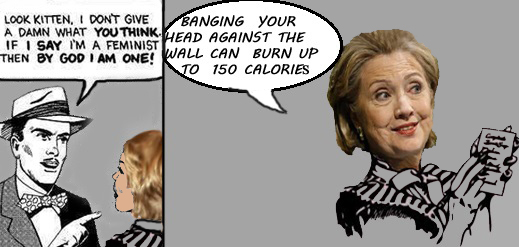
By John Helmer, Moscow
From Arseny Yatseniuk’s point of view, the US election results could not have been worse for the not-Ukrainian-prime-minister-yet. Petro Poroshenko, the Ukrainian president defeated when a minority of Ukrainians went to their ballot boxes on October 26, the US outcome is no better.
This is because exit polls are reporting the overwhelming majority of American voters to have ignored Ukraine and Russia at this week’s midterm Congressional elections, telling the winning candidates and the pollsters they have no appetite for confrontation with the Kremlin. That also means no mandate from US voters for the new Congress to spend cash in Kiev to save Ukrainians from the cold weather and the economy ruined by civil war. For most Americans, according to the polls, the cold and failing economy they are afraid of are at home
The second meaning of the US election result is that the US presidential campaign, which starts up immediately, can’t promise anything better for the Ukrainian war party or the Russian regime-changers. Rand Paul, the Republican Senator from Kentucky — who is opposed to the war with Russia he ties to officials around Hillary Clinton – made the point in 116 digital characters tweeted under the headline, HILLARY’S LOSERS: “You didnt think it could get worse than your book tour? It did. Courtesy of the U.S. voters.
According to the Rand scorecard, Mrs Clinton did 45 events for 26 candidates in the two months before Election Day. Eleven of her endorsements won; 13 lost; and two are headed in the losing direction.
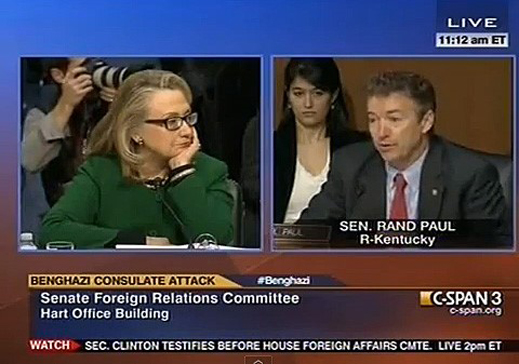
One of the few Senate races in which a candidate, the incumbent Senator Lindsey Graham of South Caroline, publicly called for tougher sanctions against Russia, was decided by a handy margin in Graham’s favour. But in issue surveys of the South Carolina voters who were for and against him, there is not a single reference to Ukraine, Russia, or sanctions. For Graham’s position-taking, along with other US senators who aren’t up for relection until next year, read this.
Countrywide, there has been next to no polling in the US — or the UK, Canada, France, Italy, Germany, Denmark, etc. — on what voters really think of going to war with Russia. According to Gallup’s polling of likely US voters before Election Day, these were the priority issues of voter concern:
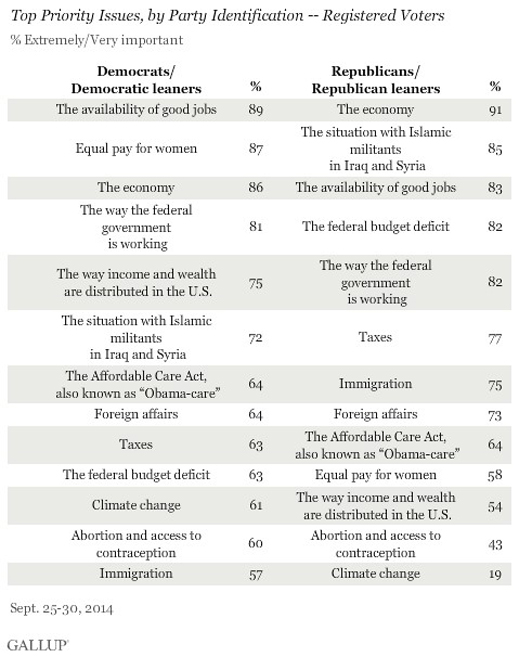
Source: http://www.gallup.com
When Gallup probed the differences between the two party voters, the big-difference issues were climate change, equal pay for women, income inequality, abortion rights, and unemployment. Republican voters turn out to be much more anxious than Democrats about invasions from abroad of two kinds – Mexicans and other illegals from the south; terrorists from the Middle East. For the Gallup pollsters, the meaning for the presidential runners now is: “candidates hoping to activate interest and turnout among Democrats would do well to focus on inequality-related issues, including unequal pay for women. Candidates looking to increase turnout among Republicans would do better to focus on the Islamic militant situation in Iraq and Syria, the deficit, and on taxes and immigration.”
Early on in the election campaign, studies of candidate propaganda revealed no reference to the Ukraine or to Russia. In March, when Gallup tried measuring the American attention span for foreign news, the timing was just after the violent coup d’etat in Kiev. Accordingly, the conflict with the Kremlin over Ukraine registered “close attention” from two-thirds of those polled. But the attention level was much lower than other foreign policy events have drawn in the recent past. It was also evident that Americans over the age of 50 were most concerned: they also signalled they didn’t want the US to become involved militarily.
 The ABC News exit poll, compiled yesterday, reports that 34% of voters said they were voting to register their opposition to President Barack Obama; 61% said they were dissatisfied, even angry with the Republican leaders in Congress. The priority issues to the ABC sample were the economy, followed by Ebola, gay marriage and marijuana legalization. Altogether,65% believe the country is headed in the wrong direction.
The ABC News exit poll, compiled yesterday, reports that 34% of voters said they were voting to register their opposition to President Barack Obama; 61% said they were dissatisfied, even angry with the Republican leaders in Congress. The priority issues to the ABC sample were the economy, followed by Ebola, gay marriage and marijuana legalization. Altogether,65% believe the country is headed in the wrong direction.
That’s more pessimistic Americans than Ukrainians, if you believe US government-funded polls. When the US Agency for International Development paid Gallup to ask the same question of Ukrainian voters before they went to the October 26 poll, just 51% — 15 percentage points less than the US score — expressed the negative answer:
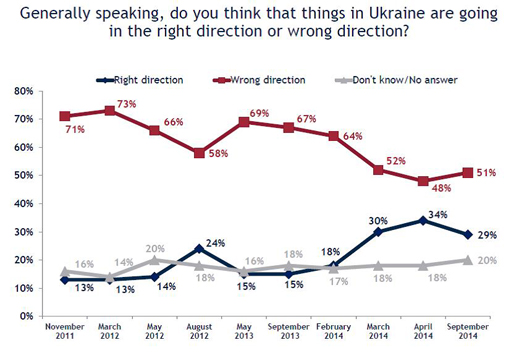
Source: http://www.iri.org
The only military action abroad supported by a majority of voters, according to this exit poll, is bombing of ISIS in Iraq and Syria. A Forbes exit poll report claims that 58% of voters in House of Representatives races approve US military action against ISIS in Iraq and Syria. But seven in ten said they were very worried about another major terrorist attack in the US. There is no reference to Ukraine and Russia because the exit pollsters already knew Americans don’t care.
One of the only think-tank analyses of American voter sentiment towards a range of foreign security threats comes from the Pew Research Center in Washington, DC. Its money was originally from the Sun Oil Company. From dividends and capital gains, the Pew family endowed the eponymous trust which pays for the think-tank. That in turn supports research of mixed quality, including a brush with Russian policy towards the Antarctic toothfish and the London Guardian’s Russophobia.
Here is Pew’s comparison of its most recent poll of US voter sentiment in August 2014, compared to November 2013:
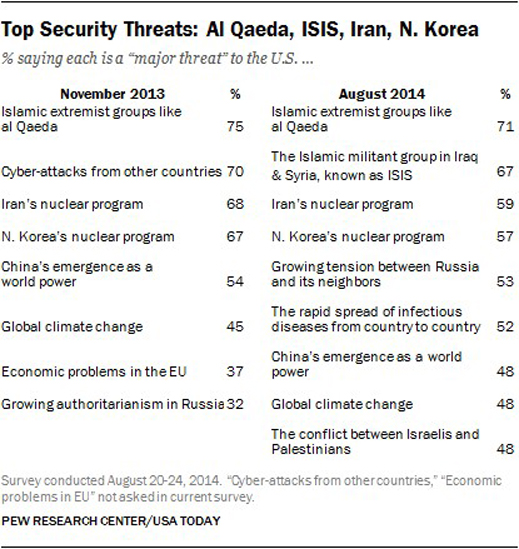
Source: http://www.people-press.org
“ISIS is now on the American public’s radar as a top threat. Islamic extremist groups like al Qaeda have been at the top of the list for years in our surveys of what the public sees as major global threats to the U.S. About seven-in-ten (71%) Americans held that view in our latest poll, while 67% of Americans say that a major threat is ISIS, which a year ago was not even on the radar. The only other threats that have ranked as high as these two since 2009, at different points in time, have been North Korea’s nuclear program, Iran’s nuclear program, cyber attacks from other countries and the Taliban’s growing strength in Afghanistan.”
“After months of confrontation with Russia over its actions in Ukraine, the share of Americans who view the Kremlin with concern has risen, but only modestly. About a quarter (26%) saw Russia as an adversary and another 49% as a serious problem, but not as an adversary, in a July survey. Those figures were little changed from our March poll, after Russia annexed Crimea. A survey in April again illustrated the public’s caution on involvement: 53% favored the use of increased economic and diplomatic sanctions against Russia, but 62% opposed sending arms or military supplies to the Ukrainian government.”











Leave a Reply